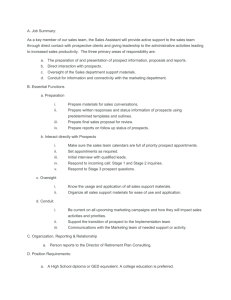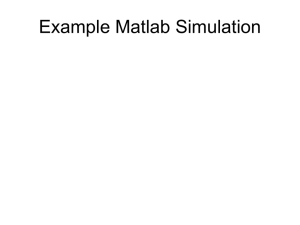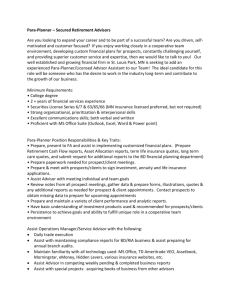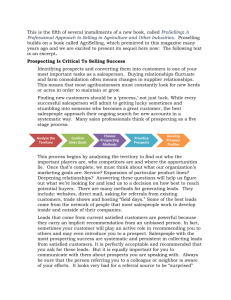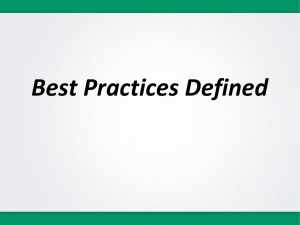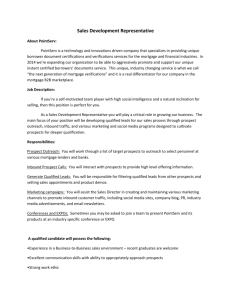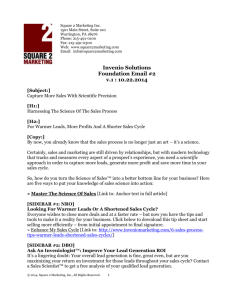Can We Reclaim Our Place In The Sales Process? by Paul McCord
advertisement
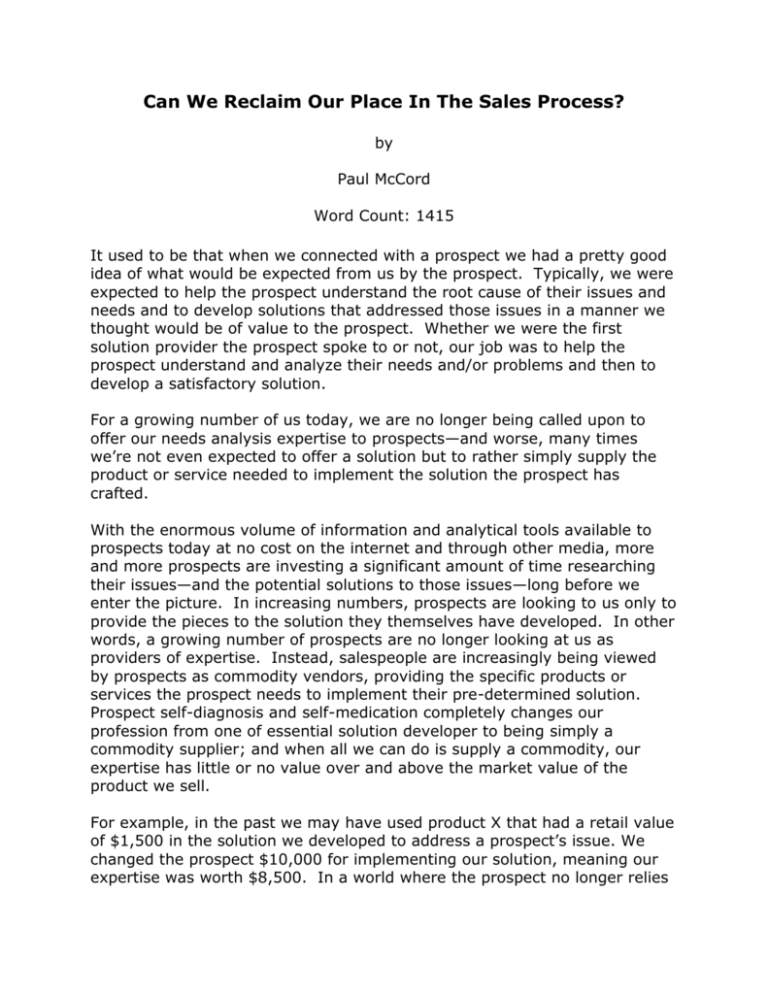
Can We Reclaim Our Place In The Sales Process? by Paul McCord Word Count: 1415 It used to be that when we connected with a prospect we had a pretty good idea of what would be expected from us by the prospect. Typically, we were expected to help the prospect understand the root cause of their issues and needs and to develop solutions that addressed those issues in a manner we thought would be of value to the prospect. Whether we were the first solution provider the prospect spoke to or not, our job was to help the prospect understand and analyze their needs and/or problems and then to develop a satisfactory solution. For a growing number of us today, we are no longer being called upon to offer our needs analysis expertise to prospects—and worse, many times we’re not even expected to offer a solution but to rather simply supply the product or service needed to implement the solution the prospect has crafted. With the enormous volume of information and analytical tools available to prospects today at no cost on the internet and through other media, more and more prospects are investing a significant amount of time researching their issues—and the potential solutions to those issues—long before we enter the picture. In increasing numbers, prospects are looking to us only to provide the pieces to the solution they themselves have developed. In other words, a growing number of prospects are no longer looking at us as providers of expertise. Instead, salespeople are increasingly being viewed by prospects as commodity vendors, providing the specific products or services the prospect needs to implement their pre-determined solution. Prospect self-diagnosis and self-medication completely changes our profession from one of essential solution developer to being simply a commodity supplier; and when all we can do is supply a commodity, our expertise has little or no value over and above the market value of the product we sell. For example, in the past we may have used product X that had a retail value of $1,500 in the solution we developed to address a prospect’s issue. We changed the prospect $10,000 for implementing our solution, meaning our expertise was worth $8,500. In a world where the prospect no longer relies on our expertise, just our product, our value to the prospect is simply the $1,500 the product sells for. We have no intrinsic value of our own because the prospect is now doing what we used to change $8,500 to do. The movement to self-diagnose and develop one’s own solution is spreading throughout the marketplace, in both business-to-consumer and business-tobusiness activities, and with increasingly sophisticated and complicated issues. The list of industries where prospects are relying less on the professional and more on themselves to analyze their issues and develop their own solutions is huge. Securities, insurance, residential and commercial mortgages, software applications, accounting and bookkeeping, legal proceedings, business structures, and dozens and dozens of other areas. How do we as salespeople fit into the sales process in this changing climate? Can we claim a place at the table when our prospects now have available to them in a couple of clicks of a mouse more information than we were capable of giving them in the past? Of course, there will always be a segment of prospects who will seek advice and guidance from salespeople they believe to be experts in their field. That group is, however, shrinking. In order for us to become relevant to those who believe they no longer need the advice, guidance, and expertise of a professional salesperson, we must: Do a better job of educating prospects and clients on what we do. Many prospects see us as offering nothing but a biased, selfserving sales pitch rather than an effective, prospect oriented solution to their issues. If we want to regain relevance with prospects who have decided they are better off doing their own research and developing their own solutions, as well as retaining those who haven’t yet moved in that direction, we will have to change their view of what sales is and who we as salespeople are. Educate before proposing a solution. Many prospects believe that our ‘solution’ to their problem is nothing more than a canned product or service that we claim is customized to meet their unique situation. And why should they believe anything else since so often we salespeople ask a half dozen questions and magically propose ‘the solution?’ Prospects are no longer willing to settle for canned solutions. Prospects today want to be educated on both the cause of their issues and the possible solutions—and the pros and cons of implementing the various solutions. If we want to become relevant once again—or stay relevant to those who haven’t yet deserted us—we will have to become educators before we become salespeople. Education must become the foundation of our sales process. And our education will have to be real education, not some slick sleight of hand marketing mumbo jumbo disguised as education. Walk away when our products and services don’t meet the prospect’s need. Prospects are skeptical of salespeople because we always have what they need. Seldom has a prospect met a salesperson that referred them to another company because their products, services, and/or expertise wasn’t appropriate to meet the prospect’s needs. Prospects expect the salesperson to try to sell them whether the product or service will meet their needs or not. If we want to be taken seriously, we have to be willing to work in the prospect’s best interest, even when that means walking away from business. Generate more value for the prospect than the prospect can get on their own. Why should a prospect pay us if we can’t bring more value to them than they can generate on their own? We have to be able to create tangible value for the prospect, whether that value is in terms of dollars, time, or security. We must be able to clearly demonstrate that we can produce greater results than they can produce, save them more time and/or energy then the cost of our products or service, or give them more security and safety than they can acquire on their own. Earn our place in the sale. We must recognize that in most instances prospects no longer need us. If we are not prepared to do an exceptional job, we are expendable. One of the reasons we find ourselves being replaced by discount providers, websites, 800 numbers, and a myriad of other cheap alternatives to professional salespeople is that we believed that prospects had to have us if they wanted or needed our product or service. Not so. Just ask the full service securities broker, the mortgage loan officer, the business banker, the pharmacist, the realtor, the telecommunications expert, and hundreds of others who were ‘indispensible’ and who are now clawing to stay alive. We can no longer take our place in the sale for granted. Our profession is changing. We are slowly becoming a profession where there is an elite group catering to the highly profitable prospects who seek the advice and guidance of top experts in their field and a mass of order takers working with those prospects who believe they can formulate their own solutions and just need a salesperson to provide certain products or services at bargain basement prices. Unfortunately, it doesn’t appear that the move to self-diagnosis and solution development will cease anytime in the foreseeable future. If that’s the case, the question becomes which do we as salespeople want to be—the expert who deals with the highly profitable segment of the market that seeks advice and guidance from a real expert--or the order taker who deals with the discount shopper? The choice is ours, but we have to make the choice because the change in the marketplace isn’t going to stop just because we don’t like it. Paul McCord, a leading Business Development Strategist and president of McCord Training, works with companies and sales leaders to help them increase sales and profits by finding and connecting with high quality prospects in ways prospects respect and respond to. An internationally recognized author, speaker, trainer and consultant, Paul’s clients range from giants such as Chase, New York Life, Siemens, and GE, to small and midsize firms, as well as individual sales leaders. He is the author of the popular Sales and Sales Management Blog (http://salesandmanagementblog.com). © 2009, Paul McCord. For information contact FrogPond at 800.704.FROG(3764) or email susie@FrogPond.com; http://www.FrogPond.com.
